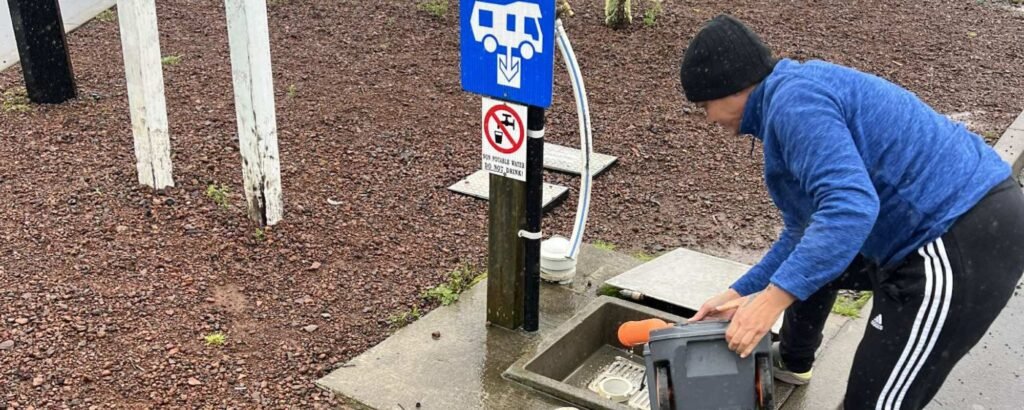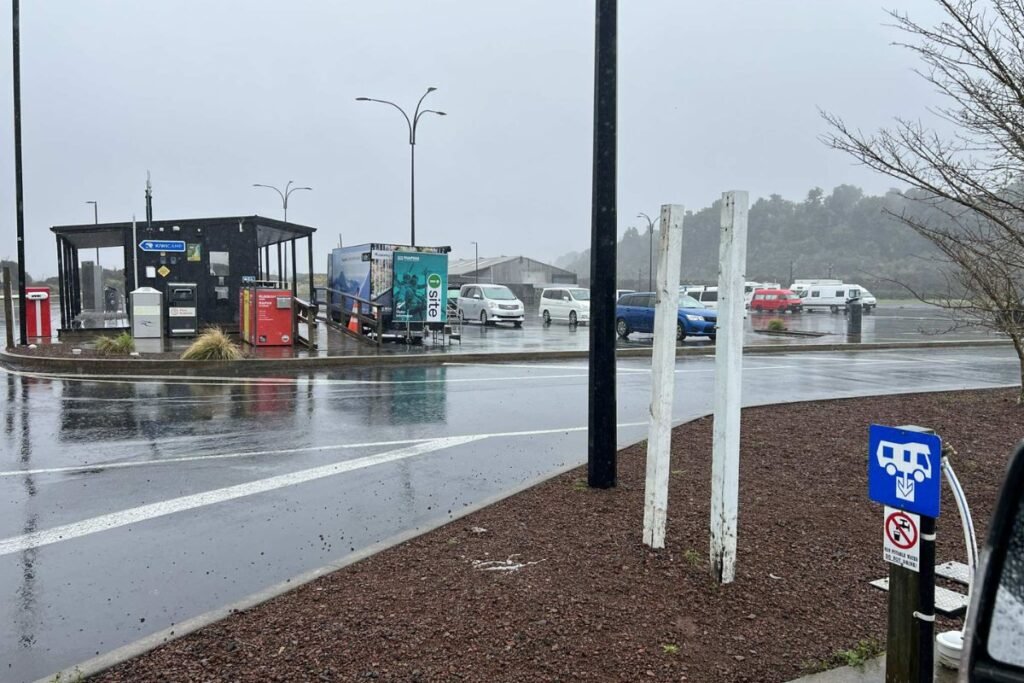
Managing waste and water is one of the most important parts of responsible campervan travel in Aotearoa – New Zealand. Whether you’re freedom camping by a lake or parked at a holiday park, it’s essential to understand how to handle fresh water, greywater, and toilet waste correctly. These practices not only protect the environment but also influence how welcome campervanners remain in local communities. As a result, learning how to manage waste properly ensures that the freedom of the road remains available for everyone.
This guide covers what you need, how to stay clean and eco-friendly, and where to dispose of everything the right way.
Table of Contents
What You’ll Need
Before hitting the road, it’s essential to be prepared with the right tools for water refills and waste disposal. Here’s what we always travel with:
- ✅ A certified self-contained vehicle with greywater and toilet holding tanks
- 💧 A food-grade freshwater hose (to avoid that rubbery taste!)
- 🧼 A separate greywater hose for clean, controlled drainage
- 🚽 Eco-friendly toilet chemicals
- 🧤 Gloves and disinfectant for safe cleanup
➡️ Tip: You can pick up all your camper hygiene gear at Mitre 10, Bunnings, or specialist RV supply stores.
Filling Fresh Water
Clean drinking water is widely available in Aotearoa—if you know where to look.
You can refill at:
- 🚰 Holiday parks and many DOC campsites
- 🚿 Public water refill points in small towns
- 🧭 i-SITE visitor centres, which often have taps available
➡️ Pro Tip: Always let the water run for a few seconds before filling to clear out sediment, and only ever use your clean drinking hose.
Greywater Disposal
Greywater is wastewater from your sink or shower—it still carries soap, food residue, and bacteria.
- ❌ Never dump greywater onto the ground, into stormwater drains, or near waterways
- ✅ Use designated dump stations—they’re clearly marked and often free
- 🚿 Drain slowly with a greywater hose to avoid mess and splashing
➡️ Reminder: Even biodegradable soaps can damage ecosystems. Always dump greywater responsibly.

Toilet Waste Disposal
Disposing of toilet waste properly is non-negotiable. It’s about hygiene, safety, and community respect.
- 🧼 Always empty cassette or tank toilets at official dump stations
- 🧤 Wear gloves and rinse your gear well after each use
- 🧪 Add toilet chemicals after every cleanout to reduce odour and break down waste
➡️ Warning: Dumping waste in the bush, roadside drains, or public toilets is illegal and incredibly damaging. It’s one of the fastest ways to get freedom camping banned—and if caught, you will be fined.
Where to Find Dump Stations
Luckily, New Zealand is well equipped with public dump points—you just need to plan ahead.
Use these to locate them:
- 📱 CamperMate – shows dump stations, reviews, and opening hours
- 📱 Rankers NZ – includes locations, filters, and helpful notes
- 🗺️ i-SITE centres – ask staff for the closest site and printed maps
Common locations include:
- 🏕️ Holiday parks
- 🏪 Petrol stations in rural towns
- 🏛️ Council-managed freedom camping areas
➡️ Tip: In remote regions, dump stations can be few and far between. Empty tanks regularly and plan refills before heading into the wild.
Cleanliness & Hygiene Tips
Keeping your setup clean is just as important as knowing where to dump.
- 🧴 Carry hand sanitiser, gloves, and wet wipes for every disposal stop
- 🔄 Rinse and clean hoses, caps, and tanks regularly
- 🚱 Never rinse any part of your waste system in a river or lake
- 💡 If your van starts to smell, clean filters and run a non-toxic tank rinse
➡️ Bonus Hack: Keep a spray bottle of diluted disinfectant in your van—perfect for wiping down gear, surfaces, and the toilet seat after each use.
Final Thoughts
Proper waste and water management isn’t just good manners—it’s essential to keeping Aotearoa beautiful and ensuring that freedom camping and vanlife stay sustainable.
With a few simple tools and the right habits, you’ll not only protect the land—you’ll show locals and fellow travellers that campervanning can be clean, respectful, and part of the solution.
➡️ Next in the Series: Where to Buy Food on the Road in Aotearoa – New Zealand: Supermarket & Cooking Tips for Campervanners
🌍 Travel Planning Resources
These are the tools we personally use and trust when planning our travels from finding a place to stay to booking activities, transport and insurance. Let your Tohu guide you — Trust the Journey and follow what feels right for you.
- ✈️Flights – Compare great deals with Trip.com then Kiwi.com for flexible, affordable options.
- 🚐 Campervans – Compare rental deals with Motorhome Republic across Aotearoa and beyond.
- 🛏️ Stays – Compare hotels on Trip.com and TripAdvisor or Booking.com.
- 🚐 Rental Cars – Compare prices and book through Airport Rentals by Motorhome Republic for trusted brands and easy airport pickup.
- 🎟️ Activities – Browse tours and experiences on Viator, Get Your Guide, or TripAdvisor
- 🚆12Go Asia – Compare and book trains, buses, and ferries across Asia in one place with 12Go.
- 🛡️ Travel Insurance – Get flexible short-term coverage with Insubuy for your next holiday.
- 🔒 Protect Your Privacy with a VPN – We recommend Surfshark VPN for secure and private browsing while travelling. It’s fast, affordable and works worldwide — perfect for public Wi-Fi at airports, cafes and hotels.
- 📱 Travel eSIM – Stay connected with Airalo
- 💼 Lounge Access – Treat yourself with Priority Pass – for UK or US
- 🎶 Events & Concerts – Book tickets worldwide through Ticketmaster.
🧭 Note: Some booking links can be a bit shy when you’re using a VPN. If one doesn’t open, try pausing your VPN or switching to a different server location or secure Wi-Fi network to get things flowing again.
Kaua e rangiruatia te hāpai o te hoe, e kore tō tātau waka e ū ki uta
Don’t paddle out of unison, or our canoe will never reach the shore